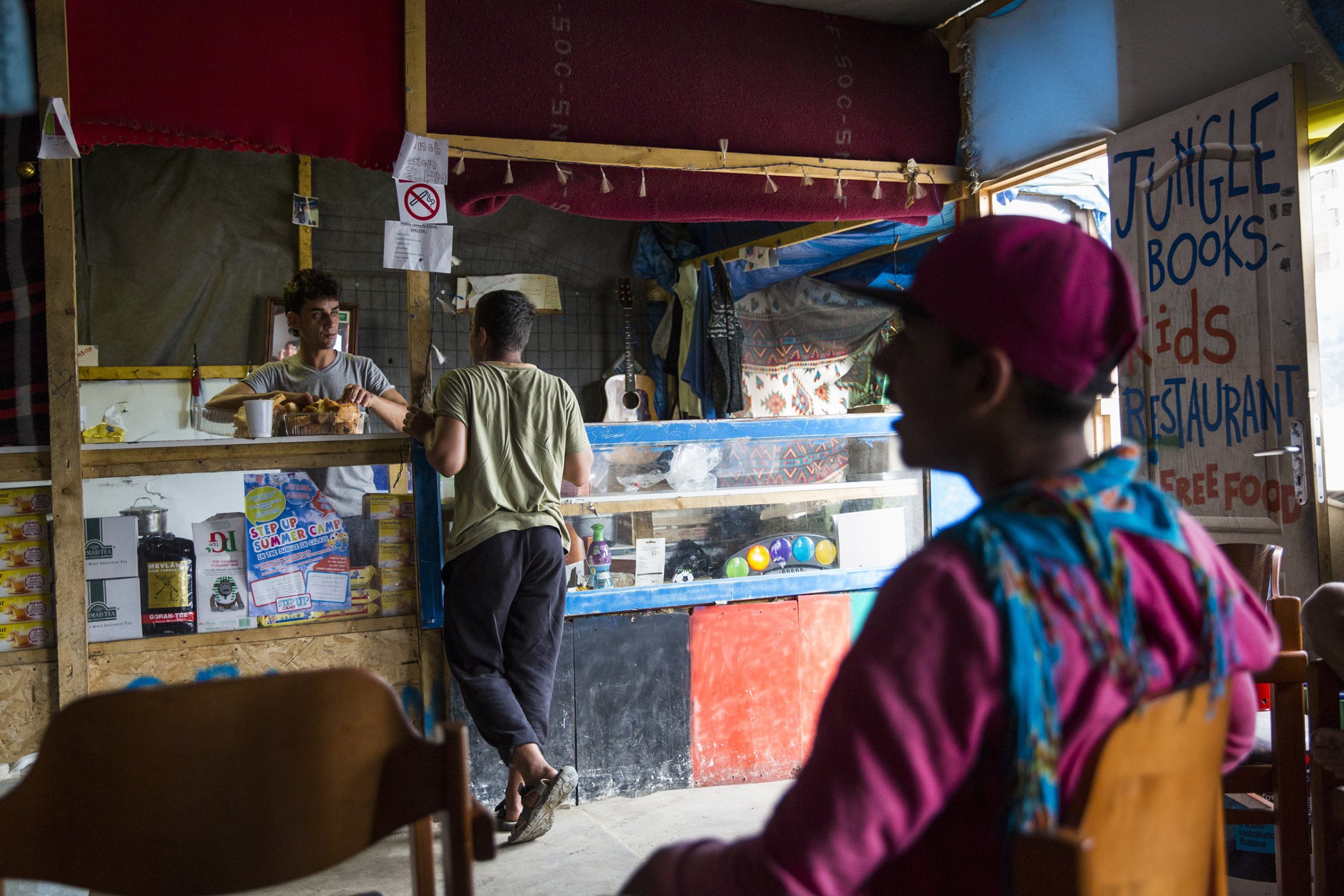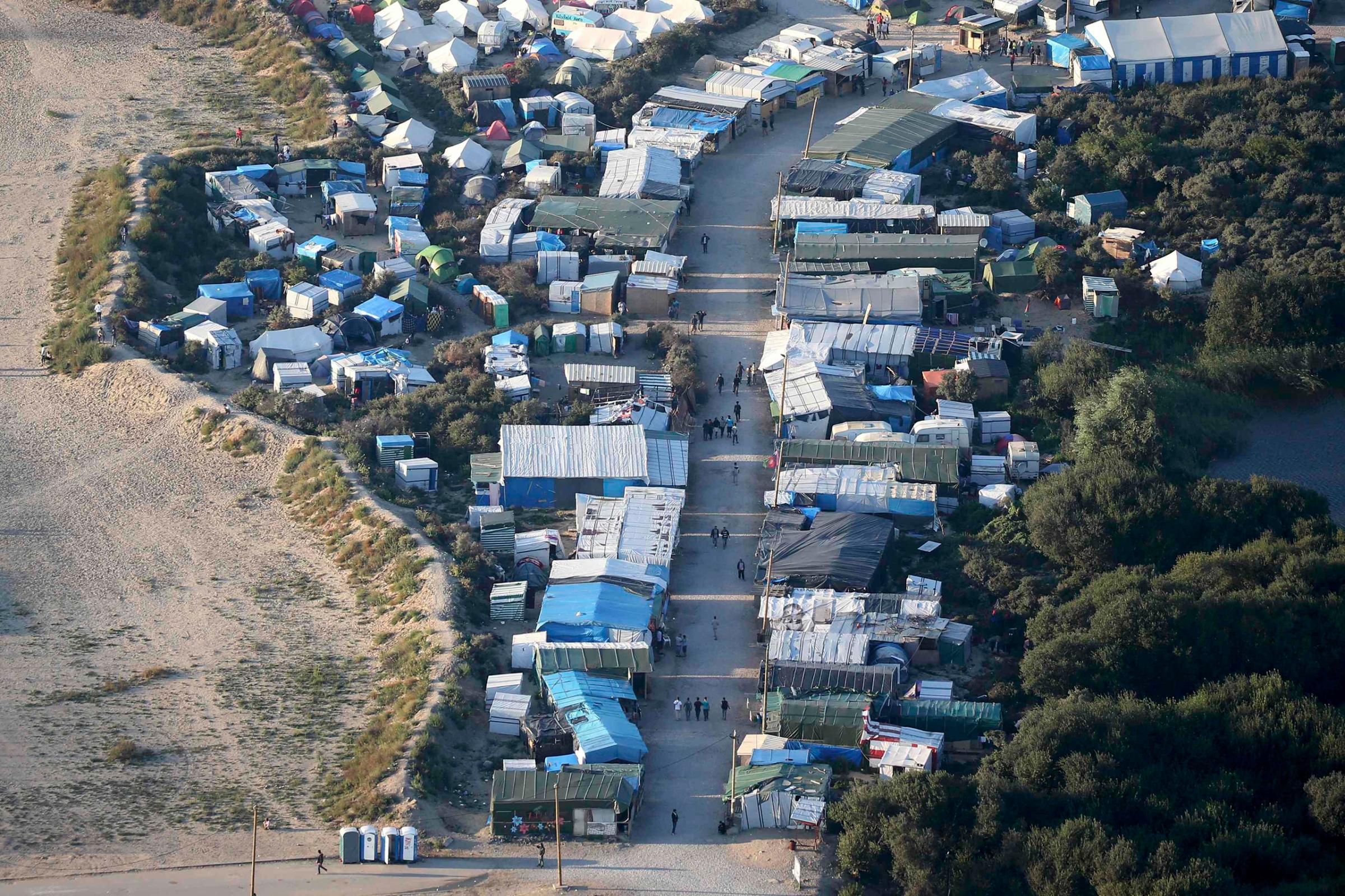
Earlier this year, Malcolm Astell left his job after 13 years teaching high school science in Yorkshire, U.K., and began considering how to use his skills before he took a new position. One option seemed most useful, he says: Teaching the refugees in the migrant camp in Calais, where thousands are now crowded into tents and rickety shelters in the unofficial settlement known as the Jungle, on the edge of the Channel that divides northern France and Britain.
Arriving in Calais in early September, Astell was stunned by what he found. While his previous school had playing fields, laboratories and well-pressed school uniforms, the Jungle’s migrants — his new students — have lost their homes, countries and possessions, and mostly survive on donations of food, clothing and other basic items. Yet, he says, every day dozens of people crowd into four makeshift classrooms, separate rectangular structures made of wood and plastic sheeting, which the aid group Jungle Books has hammered into the dirt tracks on the edge of the camp.
The camp’s residents, Astell told TIME during a recent visit, are clamoring to learn English, French or anything else he and others can teach. “Teaching here is intense,” says Astell, who plans to remain teaching in the camp — entirely for free — at least until January. “I have never been in an environment where there are people so eager to learn.”
Read more: The Migrant Kids of the Calais Jungle Refusing to Wait for the World to Act
Although Astell’s story sounds unusual, the number of volunteers in Calais’ Jungle has proliferated sharply as the population of the camp has rocketed. Relief groups say the total has risen from about 400 or so in 2014 to about 20 times that number now, amid the worst refugee crisis since the Second World War. The U.K.-based Help Refugees this month estimated there were about 10,188 migrants and refugees in Calais, more than 8,000 of whom are camping rough in the mud-slick scrub of the Jungle. Among those, it says, are more than 1,000 unaccompanied children younger than 18.
Among the volunteers in the Jungle — all unpaid — some have upturned their entire lives to be there. Many say they have left families and jobs behind, or snatched time away from their studies. “I couldn’t bear the fact that there were people drowning in the Mediterranean and nobody was, or is, doing anything about it,” says Clare Mosley, 46, who left her company and her husband at home in the British city of Liverpool. She arrived in Calais a year ago, after seeing the widely publicized photograph of Alan Kurdi, a 4-year-old Syrian boy whose dead body lay on a Turkish beach.
Mosley, who spent years as a senior manager at the accounting firm Deloitte and is a director of Dark Horse Design Ltd. in Liverpool, says she did not originally intend to stay in Calais. But she changed her mind after seeing the mammoth needs of the Jungle’s residents, and the paltry number of groups helping them. In November she founded Care4Calais, an organization that now distributes crucial items to thousands of refugees, including toothpaste, razors, warm clothes, shoes and even toilet paper.
“There was a desperate need,” she says, sitting in Care4Calais’ large warehouse near the Jungle, where about 20 young volunteers have arrived to sort piles of donated clothes, cooking utensils and toilet items. Most stay a few days, or a week or two. Mosley will remain there for the foreseeable future, she says. “Once I started, I couldn’t stop. I just carried on.”

In fact, since the Jungle is an illegal settlement, the aid organizations operate with no government or U.N. oversight—with far darker implications at times. On Friday the Independent revealed a heated debate among the groups over sexual relations between volunteers and refugees, and cited an unnamed man on a Facebook group for Jungle relief groups saying one volunteer had had multiple sexual partners in the Jungle, while another had sex with minors, according to the Facebook post; he apparently offered no proof for his claims.
Mosley told me such claims only prove the need for the Jungle to be made official by the British and French governments. “If this was an official refugee camp we would not be having these problems,” she said. “You have grassroots organizations with no training.” Care4Calais bans all sexual relations between its volunteers and the Jungle’s residents, a guideline Mosley says she copied from U.N. agencies code of conduct. “The refugees are in a vulnerable position,” she says. “They are not in a position to make that choice.”
Yet relationships between refugees and aid workers are, in fact, tolerated within L’Auberge des Migrants (the Migrants Inn), one of the Jungle’s oldest relief groups. On Friday, Maya Konforti, a former jeweler who lives in Calais and has worked in the Jungle for the organization since 2014, reacted angrily when asked about the issue on Friday. “There are love stories happening in every part of society,” she said. “It is normal that it sometimes happens between volunteers and refugees… They fall in love. They fall out of love. It is only normal.” Konforti said the organization would, however, dismiss a volunteer “who was just looking for sex in the Jungle.”
Where there is more unanimity among the volunteer groups is anger at their governments’ perceived unwillingness to help those in the camp. Many believe France and Britain have deliberately withheld aid to the Jungle, for fear of transforming it into a more permanent refugee camp. There are signs that might be partly true. French officials, for example, ban all building materials from entering the Jungle camp, where there are police checkpoints at the entrances.
And far different from refugee camps elsewhere in Europe, there are no U.N. agencies or Red Cross organizations here. “The French government has tried to ignore the problem,” Konforti says. The group’s volunteers serve 2,500 meals a day — up from 400 a day in 2014 — as well as distribute tents, sleeping bags and clothes to newcomers.
Volunteers say small, lightly equipped aid organizations are being forced to plug giant holes. “We are standing in one of the richest countries in the world at the moment, and children are living in absolutely deplorable conditions,” says Karen Moynihan, a child-protection worker from Dublin, who began working in the Jungle last February for Refugee Youth Services, one of several small aid groups that have sprung up over the past year. She helps run a social center for unaccompanied minors, about 1,000 of whom are believed to have arrived in the Jungle during the past year in a desperate attempt to make it to Britain. “The only reason volunteers are here is because the governments are not doing the job they are meant to be doing,” she says.
In fact, governments are not entirely absent. French authorities support officially sanctioned aid organizations, which offer temporary accommodation to about 2,000 migrants in Calais. But French officials say they intend to demolish the Jungle — where the remaining 80% of migrants in Calais live — within the coming months; Calais Mayor Nathalie Bouchart said this month the demolition would proceed “with the greatest determination.”
The camp has become a hot political issue at a time when French President François Hollande faces an uphill re-election contest next spring. High fences topped with barbed wire cordon off Calais’ tunnel and ferry port on the Channel to England. And this month workers began pouring the foundation for a mile-long, 14-ft. wall to reinforce that barrier, at an estimated cost to Britain of about $2.5 million.
That seems like wasted money to the volunteers in the Jungle, who are attempting to feed and clothe people with no government help. “It is like Gaza here, with the fences and walls,” says Anneliese Coury, Calais coordinator for the French group Doctors Without Borders, or MSF. “But all it does is block people’s passage,” she says, sitting in the group’s container office in the Jungle on Sept. 16.
At that moment, two men from Birmingham, U.K., burst into the MSF office carrying large cargo bags, which they said they had filled with candy for children in the Jungle. They said they had accompanied a Muslim relief organization headed to Calais to serve hot meals to residents. “It took us about seven hours to drive here,” said Sahel Mushtaq, one of the Birmingham pair. “We did not know what you might need. But we wanted to get children smiling again.”
For all these acts of individual kindness, volunteers say refugees themselves have shown the most initiative, opening grocery stores and restaurants amid the Jungle’s dirt tracks, and selling services like haircuts. “All of the main businesses inside the Jungle are founded by, run by, led by, residents of the camp itself,” says Neha Shah, 19, a literature student at Oxford University, who spent her long summer break volunteering as a teacher in the Jungle Books classrooms and working in its children-only café. “Whilst I think volunteers and aid organizations help a tremendous amount, it is also important to remember that humanity usually finds a way,” she says.
More Must-Reads from TIME
- Donald Trump Is TIME's 2024 Person of the Year
- Why We Chose Trump as Person of the Year
- Is Intermittent Fasting Good or Bad for You?
- The 100 Must-Read Books of 2024
- The 20 Best Christmas TV Episodes
- Column: If Optimism Feels Ridiculous Now, Try Hope
- The Future of Climate Action Is Trade Policy
- Merle Bombardieri Is Helping People Make the Baby Decision
Contact us at letters@time.com